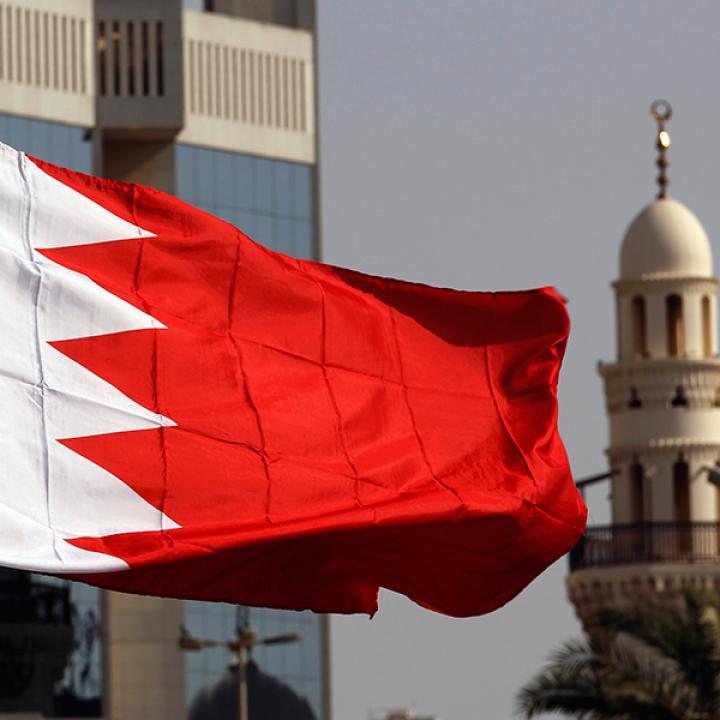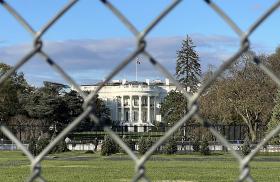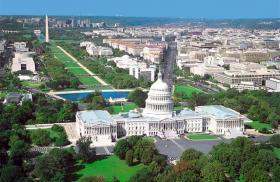
- Policy Analysis
- Policy Alert
Bahrain Doubles Down on U.S. Economic Ties

The kingdom’s recent announcement of billions in U.S. investments reflects both a strong commitment to C-SIPA and a wider Gulf alignment with the Trump administration’s foreign policy priorities.
When Crown Prince Salman bin Hamad al-Khalifa arrived in Washington last week, the importance of his visit was clear for Bahrain, a small island nation that lies across the Persian Gulf from Iran and hosts the headquarters of U.S. Naval Forces Central Command along with over 9,000 American military personnel— strategic realities that have become ever more prominent following a war in which Iran retaliated against Qatar, another American partner and military host. His specific itinerary—which included a reception at the U.S. Chamber of Commerce and a lunch banquet with President Trump—also reflected how the strategic relationship is increasingly incorporating economic overtones under the Trump administration.
During the visit, the crown prince (who also serves as prime minister) announced a combination of investments and commercial agreements with American companies, including:
- a deal for Cisco Systems to provide digital infrastructure solutions that support the Bahraini government’s information and telecommunications systems;
- plans for an 800-kilometer multifiber undersea cable to connect Bahrain, Saudi Arabia, Kuwait, and Iraq with global network infrastructure;
- $10.7 billion worth of investments in the United States by Bahraini financial institutions and private-sector companies;
- the launch of direct commercial flights between Manama and New York City;
- $2 billion in investments by Mumtalakat, Bahrain’s sovereign wealth fund, to develop downstream aluminum projects with U.S. companies.
Totaling approximately $17 billion, the deals cover a wide range of sectors such as aviation, technology, manufacturing, and finance. Tellingly, all of these sectors are key components of the Comprehensive Security Integration and Prosperity Agreement (C-SIPA), a unique framework that Manama and Washington signed in September 2023 to foster integration on security, economic, and technological matters. They brought the United Kingdom into the framework a year later and aim to expand it further, with the ultimate goal of establishing a cohesive security infrastructure and deeper economic and technological collaboration among trusted partners in the Middle East and beyond.
Last week’s agreements highlight Bahrain’s focus on expanding economic cooperation with the United States through C-SIPA, underscoring both the kingdom’s desire to be seen as a key economic player in the Gulf and its emphasis on industrial diversification. The deals also play to President Trump’s foreign policy priority of strengthening bilateral relationships through economic channels—a core theme of his recent trip to the Gulf. Since Bahrain was not on the itinerary of that May trip, the crown prince likely hoped to demonstrate in person the value that his country can provide to the United States—not just as a trusted security partner, but also as a commercial collaborator that can boost the Trump administration’s efforts to promote job creation and economic advancement. In doing so, Manama can also secure its own interests—namely, its desire to increase the kingdom’s industrial footprint, expand international cooperation, and potentially decrease certain U.S. tariffs.
Of particular note is Mumtalakat’s $2 billion investment in U.S. downstream aluminum projects, which will turn the material into usable products. Bahrain is already a regional leader in the upstream processes of extracting and producing aluminum; its firm Aluminum Bahrain (Alba) has become one of the world’s largest smelters outside of China. An active expansion into downstream projects may give Manama additional negotiating leverage when seeking to lower President Trump’s tariffs on aluminum, which were set at 10 percent during his first administration and have now increased to 25 percent. By showing it is taking U.S. interests into account, the kingdom could gain concessions on this front. More broadly, downstream projects can help boost its efforts to diversify the economy and make it more resilient.
The aluminum agreement also indicates Bahrain’s vote of confidence in what it can yield from long-term investments in the United States. For Mumtalakat, $2 billion is about 11 percent of its total assets managed—a large figure for a single investment, especially for a country that has high government debt and was heavily reliant on its neighbors for economic support until recently. By comparison, Saudi Arabia’s Public Investment Fund manages an estimated $925 billion in assets, around 9 percent of which are allocated for U.S. investments. And the two largest sovereign wealth funds in the United Arab Emirates—Abu Dhabi Investment Authority and Mubadala Investment Company—have around 30-45 percent of their portfolios in U.S. assets. (These numbers may rise if the initiatives from Trump’s Gulf trip are implemented as planned.)
By making these announcements and holding a high-profile White House meeting at such a high-stakes regional and international moment, Washington and Manama are signaling their lasting intent to deepen their commercial ties through C-SIPA. In addition, expanding the partnership beyond defense ties may help reinforce their mutual need for a more multifaceted relationship—one capable of securing key supply chains and positioning both countries as leaders in the evolving geopolitical landscape of trade and technology.
Elizabeth Dent is a senior fellow at The Washington Institute and former director for the Gulf and Arabian Peninsula at the Pentagon.



